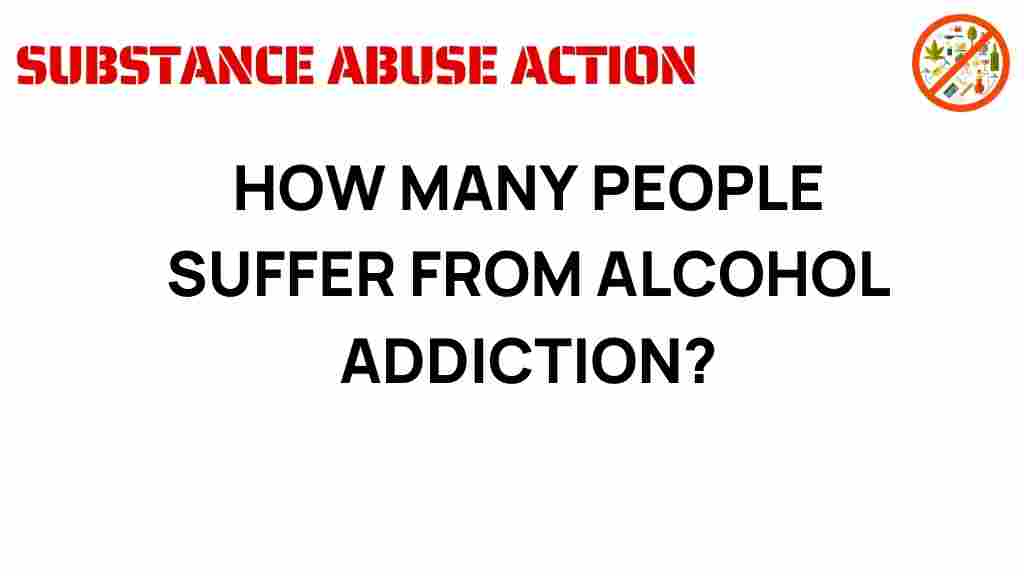Unveiling the Statistics: How Many Are Affected by Alcohol Addiction?
Alcohol addiction is a critical public health issue that affects millions of individuals and families worldwide. Understanding the statistics surrounding alcohol addiction is essential for raising awareness, improving treatment options, and supporting recovery efforts. In this article, we will delve into the prevalence of alcohol addiction, its impact on mental health, the importance of intervention, and the available resources for treatment and recovery.
The Prevalence of Alcohol Addiction
Alcohol addiction, also known as alcoholism or alcohol use disorder (AUD), is more common than many people realize. According to the National Institute on Alcohol Abuse and Alcoholism (NIAAA), nearly 15 million adults in the United States struggle with alcohol addiction.
- Approximately 5.3% of adults aged 18 and older have alcohol use disorder.
- Among youth, about 414,000 adolescents aged 12 to 17 have AUD.
- Alcohol addiction contributes to over 95,000 deaths annually in the United States.
These statistics highlight the significant prevalence of alcohol addiction and its dire consequences on public health. The implications extend beyond the individual, affecting families, communities, and healthcare systems.
The Impact of Alcohol Addiction on Mental Health
Alcohol addiction does not only affect physical health; it also has profound effects on mental well-being. Individuals struggling with alcohol addiction are at a higher risk for several mental health issues, including:
- Depression
- Anxiety disorders
- Bipolar disorder
- Post-traumatic stress disorder (PTSD)
Moreover, the relationship between alcohol addiction and mental health is often cyclical. Mental health disorders can lead to increased alcohol consumption as individuals seek to alleviate their symptoms. Conversely, excessive alcohol use can worsen mental health conditions, creating a challenging cycle that is difficult to break.
Understanding the Risks Factors
Several factors contribute to the risk of developing alcohol addiction, including:
- Genetic predisposition: A family history of alcoholism can increase an individual’s risk.
- Environmental influences: Exposure to alcohol at a young age, peer pressure, and cultural norms can play a role.
- Psychological factors: Individuals with mental health disorders may turn to alcohol as a coping mechanism.
By understanding these risk factors, we can better identify vulnerable populations and implement effective prevention strategies.
The Importance of Intervention and Support
Intervention is a crucial step in addressing alcohol addiction. Recognizing the signs of addiction and seeking help can significantly improve an individual’s chances of recovery. Common signs that someone may need intervention include:
- Neglecting responsibilities at work, school, or home.
- Continued use of alcohol despite negative consequences.
- Withdrawal symptoms when not drinking.
- Increased tolerance to alcohol.
Support from family and friends plays a vital role in the recovery process. Encouraging open conversations about addiction and providing resources for treatment can foster a supportive environment for those struggling with alcohol addiction.
Available Treatment Options
Several treatment options are available for individuals struggling with alcohol addiction. These include:
- Detoxification: A medically supervised process to safely manage withdrawal symptoms.
- Rehabilitation programs: Inpatient or outpatient programs that provide counseling and therapy.
- Support groups: Organizations like Alcoholics Anonymous (AA) offer peer support and accountability.
- Medication: Certain medications can help reduce cravings and support recovery.
Choosing the right treatment option depends on individual circumstances and needs. Consulting with a healthcare professional can help determine the best approach.
Challenges in Recovery
While recovery is possible, it is often accompanied by challenges. Common obstacles include:
- Strong cravings for alcohol.
- Social pressures and triggers.
- Co-occurring mental health disorders.
Overcoming these challenges requires ongoing support and commitment. Engaging in therapy, attending support groups, and maintaining a healthy lifestyle can greatly assist individuals on their path to recovery.
Statistics on Recovery Success Rates
Despite the challenges, many individuals successfully overcome alcohol addiction. Statistics indicate that:
- About one-third of individuals who are treated for alcohol problems have no further symptoms a year later.
- Many who do recover experience fewer alcohol-related problems over time.
- Long-term treatment and support can significantly improve recovery rates.
These statistics underscore the importance of persistence and the availability of support systems throughout the recovery journey.
Public Health Implications
Alcohol addiction poses a significant burden on public health. The costs associated with alcohol misuse are staggering, including:
- Healthcare expenses
- Lost productivity
- Criminal justice costs
- Transportation-related accidents
Addressing alcohol addiction through public health initiatives can help reduce these costs and improve community well-being. Programs aimed at prevention, education, and treatment can make a meaningful difference in combating alcohol addiction.
Getting Help: Resources and Support
If you or someone you know is struggling with alcohol addiction, it’s essential to seek help. Resources include:
- Substance Abuse and Mental Health Services Administration (SAMHSA) National Helpline
- Alcoholics Anonymous (AA)
- Local treatment centers and support groups
Support is available, and taking the first step towards recovery can lead to a healthier, happier life.
Conclusion
Alcohol addiction is a prevalent issue that significantly impacts individuals, families, and public health. By understanding the statistics surrounding alcohol addiction, we can better address this crisis through effective intervention, treatment, and support. Recovery is possible, and with the right resources and commitment, individuals can overcome addiction and rebuild their lives.
For more information on treatment options and support, visit our resource page.
This article is in the category Addiction and created by SubstanceAbuseAction Team
